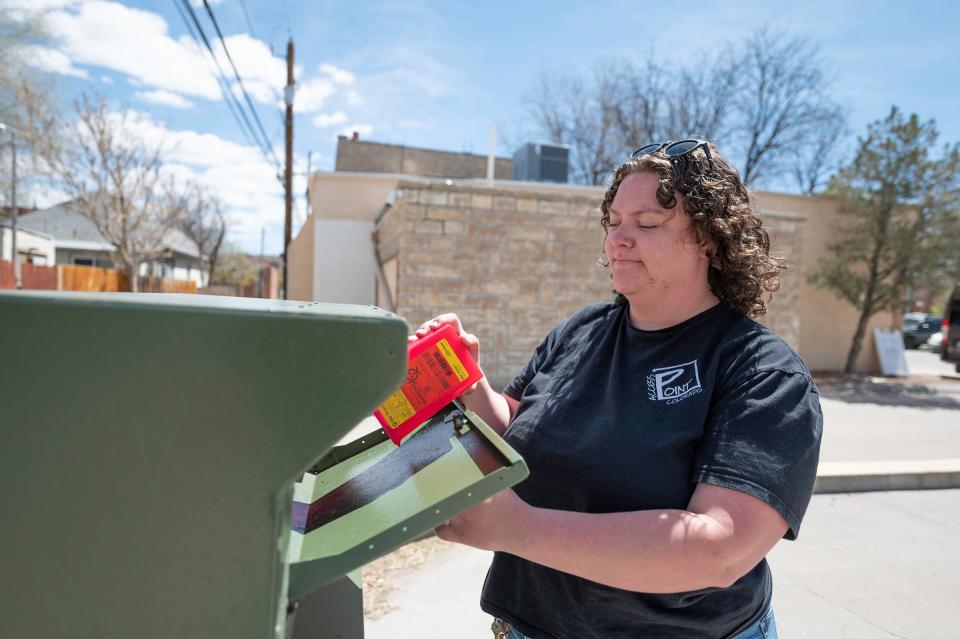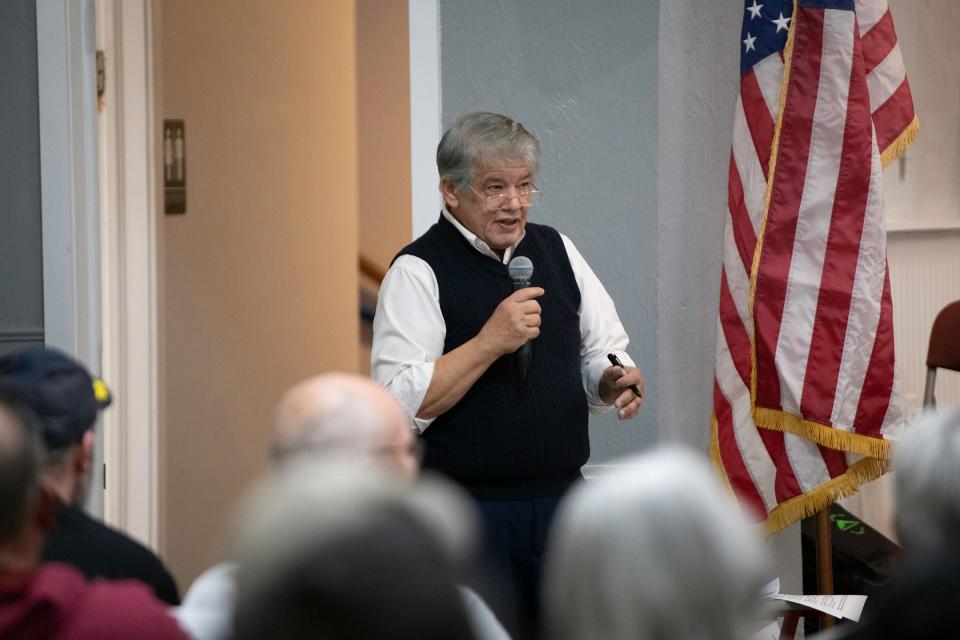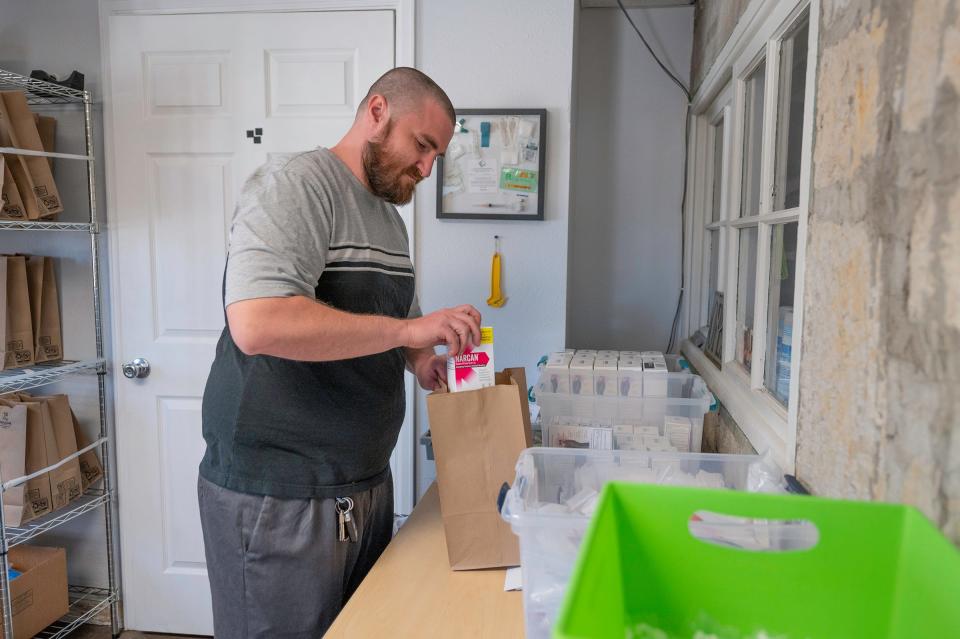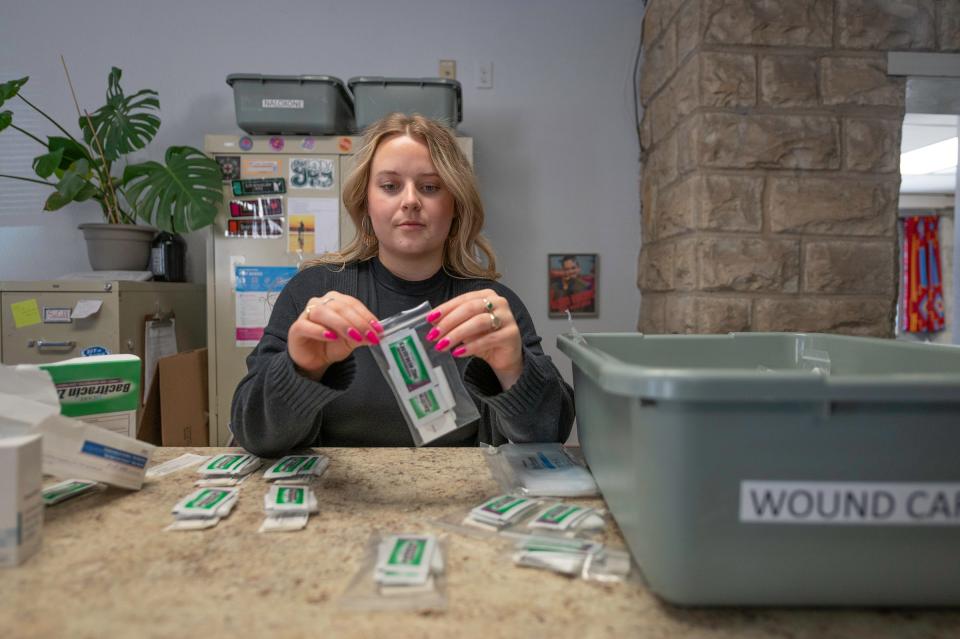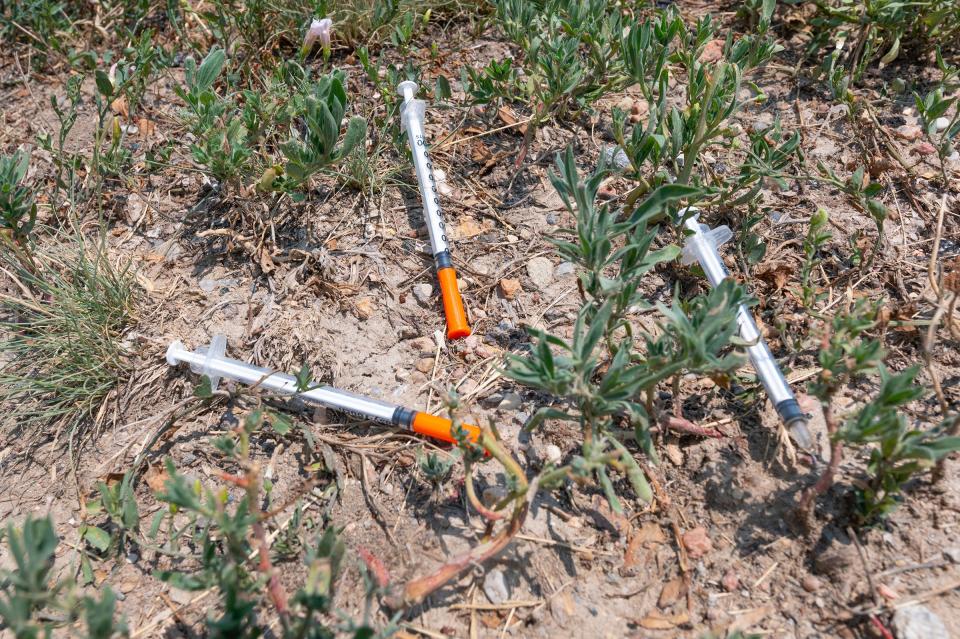As Pueblo City Council debates whether to ban syringe access programs in the city, the agencies that operate them in Pueblo are coming forward to defend them.
The Southern Colorado Harm Reduction Association (SCHRA) and Access Point Pueblo say syringe access programs — also known as syringe service or needle exchange programs — play a pivotal role in reducing overdoses and decreasing the spread of infectious bloodborne illness. They also provide other services for addicts, like counseling, wound care, and building critical relationships that help get clients into addiction treatment.
The issue has come to a head in recent weeks, with Counselor Roger Gomez proposing an ordinance to ban syringe exchange programs within city limits.
Why Gomez wants to kick syringe exchanges out of town
Gomez discussed his opposition to syringe access programs with District 4 residents during a town hall on March 28, in which Pueblo County Commissioner Eppie Griego also voiced his opposition and said harm reduction is "promoting illegal drugs."
Gomez did not respond to requests for comment from the Chieftain for this story, but in a previous interview, he stated that while there was an initial plan to move the program run by the SCHRA from its current location at 1249 Routt Ave. to 219 West Northern Ave., the Northern Avenue site would've been located near a residential neighborhood, which he opposes.
Gomez also cited fears of discarded needles near "iconic" Pueblo businesses, which he stated were "already struggling to survive," and claims that syringe access programs simply "enable" drug usage.
"Another thing I always hear (is), 'These folks are human,'" Gomez said. "Well, so are taxpayers. And they have to put up with crime, homelessness (and) poverty, and it's in those areas where they are most prevalent as opposed to other districts in Pueblo."
Gomez stated that while he had visited the SCHRA facility, he was not familiar with any local data concerning the efficacy of syringe exchange programs.
Data shows syringe access programs lower bloodborne illnesses and overdoses, provide critical services
Data from Access Point Pueblo, one of two syringe exchange programs within city limits, indicates that the program has been highly successful in providing life-saving care to clients who struggle with substance use disorder.
According to data provided by Access Point Pueblo, 266 individuals received referrals to substance use treatment and healthcare providers between March 2023 and March 2024.
During that time, 145 clients visited with Southern Colorado Family Medicine residents through a partnered clinic with the syringe access program on Tuesdays.
On-staff therapists have had 347 engagements with syringe access participants, resulting in 53 participants returning for additional behavioral health services after the initial engagement. This integrated behavioral health program, Connection Point, only began this year, according to Access Point Pueblo.
Over the past three years, the organization also has greatly increased access to infectious disease testing in Pueblo, with HIV testing increasing by 372% and hepatitis C testing increasing by 294% from 2020 to 2023, according to the agency's data.
In 2021, the program introduced syphilis testing, which increased by 210% between 2021 and 2023.
The organization notes a major shift in drug usage has occurred since the COVID-19 pandemic: heroin was the primary opioid used among program participants up to a year ago, but it has since been surpassed by fentanyl.
Fentanyl has a variable potency but can be up to 100 times more potent than morphine. To that end, the program also provides Narcan to reverse drug overdoses.
Access Point Pueblo program participants self-reported nearly 1,300 overdose reversals over the past three years, with 494 reversals in 2021, 515 in 2022, and 280 in 2023.
"Statewide fatalities have continued to rise. In Pueblo County, we were one of few counties that saw a decline from 2020 to 2021," Access Point officials told the Chieftain. "We experienced an increase from 2021 to 2022 in Pueblo, following national and statewide trends. Overall, continued access to naloxone for people who use drugs has saved countless lives — more than we could accurately capture due to self-reporting."
At a national level, the United States Center for Disease Control states that syringe service programs are associated with an estimated 50% reduction in HIV and hepatitis C infections. They also prevent overdose deaths and promote public safety by providing safe needle disposal and reducing the number of discarded needles in a community.
Harm reduction experts say removal of service would harm vulnerable population
Christine Charron, prevention services manager for Access Point Pueblo, believes that a ban on syringe access programs would have severe detrimental effects on the city.
While Access Point would continue to provide other harm-reduction services such as free counseling and screening for blood-borne pathogens, it would be harder to connect people to services without the initial draw of the syringe access program to get people through the door, she said.
"The way we've been successful is that we provide a very low-barrier service for our harm reduction programs," Charron said. "People can come, get what they need to stay alive, keep themselves and their loved ones healthy, and oftentimes, share those supplies with others who aren't able to make it here.
"So (if the program was banned) we would probably see lower uptake of things like treatment for hepatitis C and HIV, so we wouldn't be surprised if there was a much higher risk of outbreaks in the community."
Charron also noted that Access Point Pueblo and the SCHRA are the only two places in town that offer free, accessible disposal services for dirty needles. Without those services, she said Pueblo would likely see increased syringe litter.
Furthermore, Charron stated she believes there would also be a spike in overdose deaths.
"Our participants and community are very good at taking care of themselves, always getting Narcan, getting extra Narcan to pass out," she said. "And we're just concerned that if we were to have our core service of harm reduction supplies banned, how would that impact the way people are able to access the lifesaving drug Naloxone or testing strips?"
Jude Solano, founder of SCHRA, concurred with Charron.
Solano stated that neither Gomez nor any other city official consulted with her on the proposed ordinance to ban syringe access programs. She expressed fears that banning them would lead to a "public health crisis" from bloodborne illnesses spread through dirty syringes and the secondary elimination of public health services provided to a vulnerable population.
Solano contested that with no way and no incentive to dispose of dirty needles safely, drug users would simply continue to use dirty needles, causing infections. Furthermore, overdoses would also likely increase, she said.
Like their counterparts at Access Point Pueblo, the SCHRA also operates a variety of different programs, Solano said, connecting clients to other forms of important treatment.
"We do 10 different programs. We work with folks struggling with a substance use disorder at every level," Solano said. "People who have been incarcerated or are in jail, we get them jobs, housing, food, all those things that need to be handled at a more holistic level. We get people into treatment and off the streets all the time — every week this is happening."
Solano anticipates that if the programs are banned in the city, Pueblo will also likely see much more syringe litter.
"You hear all the time from politicians about piles of syringes, but you don't really see a lot of them. You will see them if we go away," she said.
"This will happen. Before starting and moving into where we are now, which is on Routt and Northern, you did see these piles of syringes everywhere. Now and then you'll still see a couple, but it's nothing compared to what it was."
A first reading of Gomez's proposed ordinance will take place during the city council meeting on April 22, according to the city's director of public affairs, Haley Sue Robinson. A second reading will take place on Monday, May 13, if it passes the first reading.
Chieftain Reporter Anna-Lynn Winfrey contributed to this report.
Questions, comments, or story tips? Contact Justin at jreutterma@gannett.com. Follow him on X, formally known as Twitter, @jayreutter1. Support local news, subscribe to The Pueblo Chieftain atsubscribe.chieftain.com.
This article originally appeared on The Pueblo Chieftain: Pueblo needle exchanges defend mission as city council considers ban
